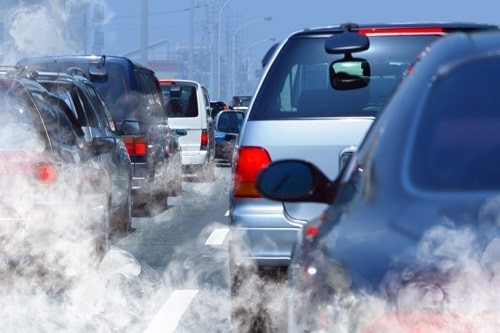While dealing with the Covid pandemic has taken centre stage, another even more life-threatening issue has continued to worsen – that of air pollution.
Opinion
Air pollution: we must protect outdoor workers
Recently published research by the Universities of Harvard, Birmingham, Leicester and University College London states that poor air quality from burning fossil fuels, such as coal and diesel, was responsible for more than eight million deaths in 2018 – roughly one in five deaths worldwide.
Further evidence comes from the inquest into the premature death of nine-year-old Ella Adoo-Kissi-Debrah, which found that air pollution “made a material contribution” to her death – the first time this has been recorded on a death certificate. Ella had asthma and lived next to one of London’s busiest roads.
 Despite UK air pollution monitors showing dangerously unhealthy air for years, government and employers have failed to act to remove the hazard. Photograph: iStock
Despite UK air pollution monitors showing dangerously unhealthy air for years, government and employers have failed to act to remove the hazard. Photograph: iStock
There has been mixed news on the effect of lockdown on ambient air pollution but the issue will continue to be a real danger to workers and the public unless action is taken.
We’ve known for a very long time air pollution is bad for us and that it is increasing at an alarming rate. We’ve also long known about the link between air pollution and climate change – the even worse disaster knocking on our front door.
Despite UK air pollution monitors showing dangerously unhealthy air for years, government and employers have failed to act to remove the hazard or reduce the risk significantly. This is why TUCAN, the Trade Union Clean Air Network, is saying clean up the air we breathe – NOW.
Indoor and outdoor workers are significantly exposed to air pollution and it is their employers’ responsibility to take measures under health and safety law – specifically the Control of Substances Hazardous to Health Regulations, which require employers to assess the harm to workers’ health from ambient air pollution like any other hazardous substance. They must then eliminate the hazard altogether or significantly reduce the risk to workers’ health.
TUCAN recognises that the government’s role in this is key and the failure to adopt the World Health Organization’s air quality standards into UK law in a new Environment Act (currently delayed three times already) and enforce these standards is a major problem.
But more important is the failure to convince employers and manufacturers to tackle their own contributions to ambient air pollution and to enforce their clear legal duty to act and prevent harm to their workers and to the public who are affected by their work activities.
TUCAN is a trade union based organisation providing training and advice to health and safety representatives on raising the issue of air pollution with their fellow workers and employers, and getting it risk assessed, investigated and action taken to prevent it.
Safety reps can use COSHH and environmental law which has vehicle exhaust fume exposure limits that do not exist in workplace law. Air pollution is a trade union issue as it affects workers and their families and needs to be discussed at workplace safety committees and beyond – for example, by parents’ bodies, community organisations and local and regional governments.
We need greater recognition that almost everyone at work is affected – not just drivers and outdoor workers, as indoor workers also breathe air that comes from outside and is polluted. Work inside can be affected by pollution from work outside and vice-versa, and everyone has to get to work along roads in cars, vans, buses and bikes, and on trains, which should all be taken into account.
And action can be taken that results in meaningful change. The best recent example is possibly that of Transport for London (TfL), which runs most of London’s public transport services. Contractors wishing to work for TfL were told
their vehicles, plant and equipment must meet the ULEZ (Ultra Low Emissions Zone) requirements or they wouldn’t be allowed to work for TfL.
They met them, and did so in good time. The project has gone so well that TfL recently reported that, as of 1 March 2021, 90 per cent of all heavy road vehicles entering the ULEZ were compliant with the new standard.
Mick Holder CMIOSH is a volunteer with TUCAN – the Trade Union Clean Air Network
OPINION

Is workplace health safe in 2026?
By Kevin Bampton, BOHS on 10 February 2026
UK Government efforts to boost the economy and employment levels through approaches such as deregulation pose a serious threat to the country’s workplace safety standards and the health of our workforce.

How stress and burnout will shape the workplace in 2026
By Charlotte Maxwell-Davies, Mental Health UK on 09 February 2026
Burnout is rapidly becoming one of the nation’s most significant workplace challenges. It is emerging as a defining issue for organisations and wider society, as the UK contends with a long-term sickness crisis driven by poor mental health. Stress can be motivating in short bursts, but when left unmanaged it contributes to work absences and lost productivity, as well as presenting a clear risk to the health of workers.

A new year, a new approach to risk?
By Mike Robinson FCA, British Safety Council on 02 February 2026
The rulebook is becoming obsolete faster than we can rewrite it. While bureaucracies labour to update yesterday’s regulations, the world of work transforms daily.



